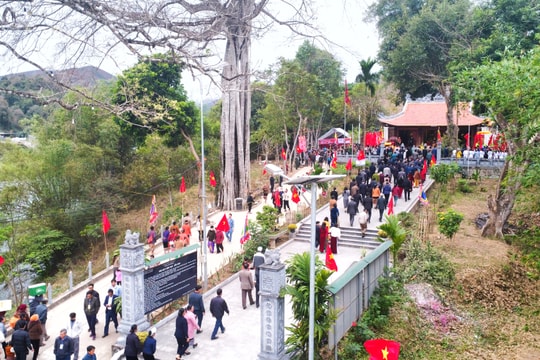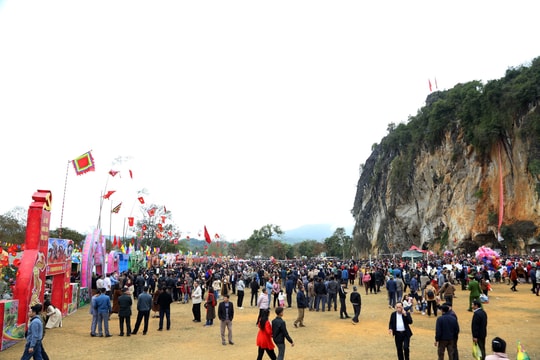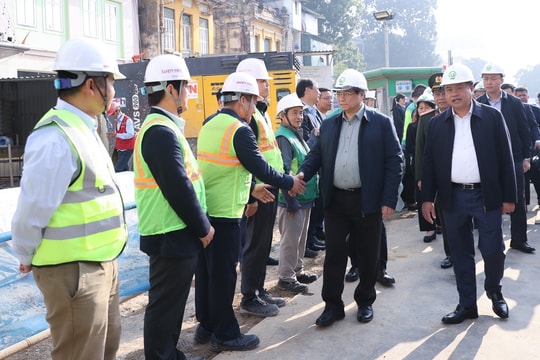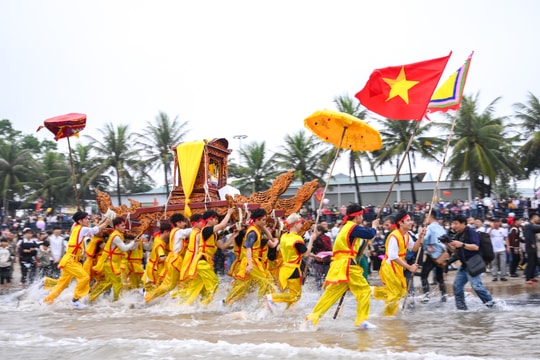Towards the values of truth, goodness and beauty during the holiday season
(Baonghean.vn) - In the atmosphere of the early Spring festivals of Giap Thin 2024, Nghe An Newspaper had an interview with folk culture researcher Nguyen Hung Vi - former lecturer of the Faculty of Literature, University of Social Sciences and Humanities (Vietnam National University, Hanoi).
PV:Sir, localities across the country are entering the peak of the early Spring festival season of Giap Thin 2024 with many unique and rich activities. And in many temples and pagodas associated with festivals, there are often activities such as burning votive paper, offering prayers to ward off bad luck, etc., and these activities are especially popular during the festival season. Can you tell us about the origin of these activities in the religious life of Vietnamese people?
Researcher Nguyen Hung Vi:Regarding the custom of burning votive paper, I would like to analyze clearly the definition as well as the belief. “Vang votive paper” from Sino-Vietnamese is “ma hoang”, in which “ma” means to worship the earth god, to worship the underworld. It is in the word “te ma” and is interpreted as: In ancient times, when soldiers went somewhere, they would set up an altar to worship the earth god there, called “te ma”. Later, the word “ma” was separated but still had the meaning of worshiping the underworld.
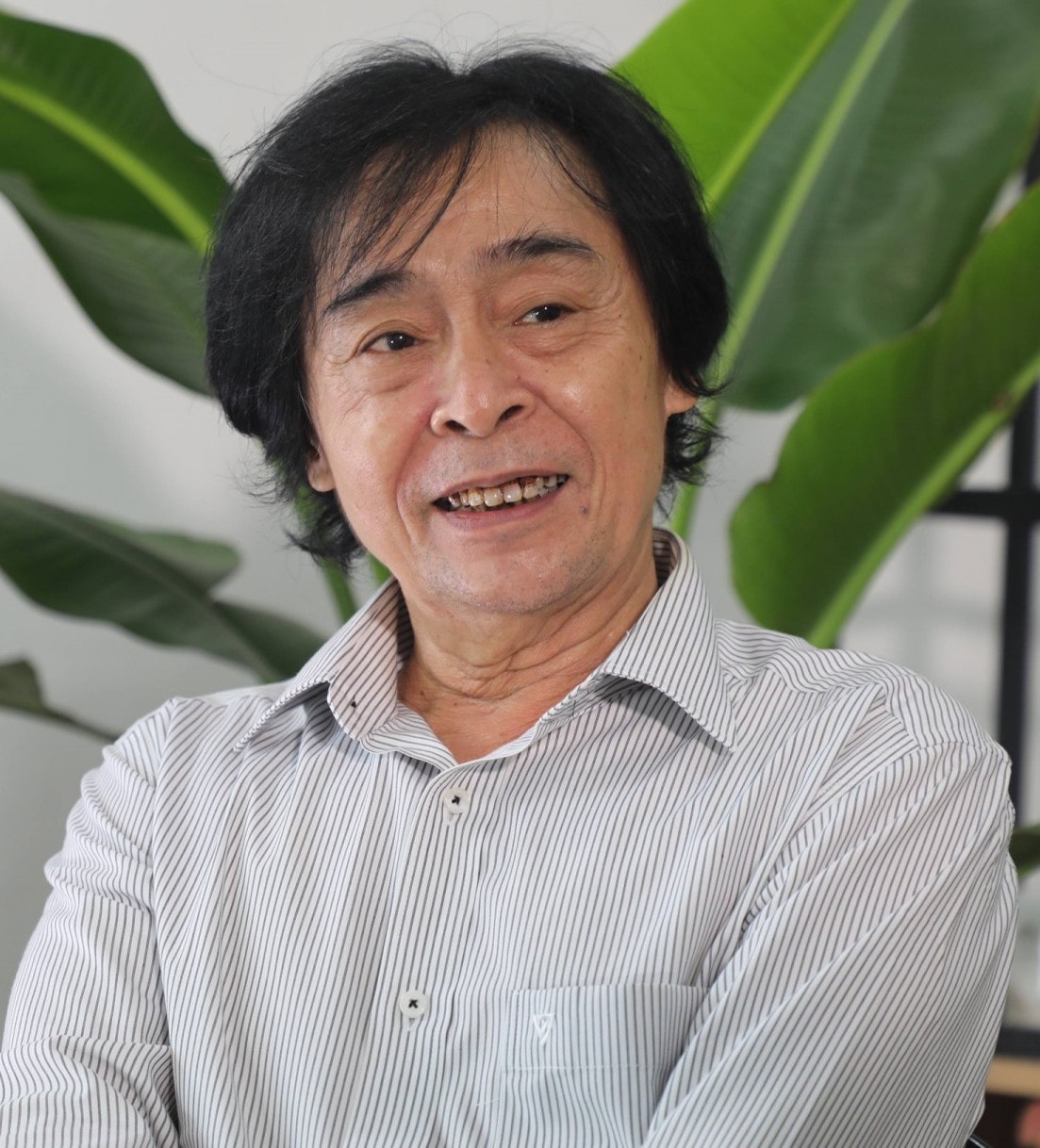
The word “hoang” is defined in the dictionary as “a piece of paper with printed images of coins for offerings, or a piece of paper gilded with color for offerings”. “Ma” is pronounced as “ma” in some regions, while “hoang” is pronounced as “vang” (the word “hoang” meaning yellow is also pronounced as “vang”). So “vang votive paper” is a piece of paper printed or gilded with images of coins for offerings to the underworld. Many people who do not look it up think “ma” is a horse and “vang” is a gold bar.
In terms of beliefs, in the past, death meant going to live in another world, so people buried the tools and weapons of the deceased. Gradually, people saw this as a waste, and moreover, it led to grave robberies, so people created fake burial objects called "minh khi" ("minh" means darkness, underworld, "khi" means tools). During the Han Dynasty, papermaking techniques became widespread, people replaced "minh khi" with paper and burned it for the deceased.
Thus, in the process of appearing votive paper, there are elements of belief, elements of superstition, but rich in symbolism, and is a way to save in the ritual of worshiping the dead. Later, the priests of Taoism developed it into a ceremony, and it became a long-standing custom and practice in the East.
The custom of offering sacrifices to the stars to ward off bad luck comes from the belief that each year, a person will correspond to one of the nine main stars (nine stars): Thai Duong, Thai Am, Moc Duc, Thai Bach, Tho Tu, Van Han, Thuy Dieu, Ke Do, and La Hau.
Of the 9 stars corresponding to the fate of each person's age, 2 stars Rahu and Ketu belong to ancient Indian astrological knowledge. The other 7 stars are found in both Eastern and Western astrology.
From those 9 stars, they combine with the horoscopes of men and women to make a judgment. There are 3 good stars: Thai Am, Thai Duong, Moc Duc (Moon, Sun and Jupiter), the remaining 6 stars are bad stars - harmful to health, money, human destiny, and the worst is Thai Bach (Venus). Anyone who encounters a bad star must perform a star offering ceremony to dispel bad luck in life. This is a synthesis of Taoism, Buddhism, Confucianism and folk beliefs.
Folklore researcher Nguyen Hung Vi was born in 1955 in Hung Khanh commune, now Hung Thanh commune (Hung Nguyen), and currently lives in Hanoi. He graduated from the Faculty of Philology, Hanoi University of Science in 1977 and researched and taught at the Faculty of Philology from 1978 until his retirement in 2016.
He was trained and specialized in medieval literature, folk literature, folk culture, Vietnamese culture and language. He is one of the leading experts on Vietnamese folk culture, with thousands of articles published in newspapers and magazines in this field.
PV:It is known that for many years, during the New Year festival as well as in people's daily life, the practice of these religious activities has been distorted, negatively affecting social life. As a researcher of folk culture, could you please tell us more specifically about this issue?
Researcher Nguyen Hung Vi: In today's festivals, activities such as burning votive paper, offering prayers to ward off bad luck or fortune telling... are superstitious activities. They belong to the negative part of beliefs.
For example, the custom of burning votive paper in Vietnam has gradually moved away from its original good purpose over time, and has now become excessive. In the past, our ancestors taught us "a sincere gift", burning votive paper is for descendants to remember their ancestors, hoping that their ancestors will have a peaceful life in the afterlife, praying and also letting their ancestors know that their descendants are living in peace and doing well. But now that good meaning has given way to superstition, believing that the more they burn, the more fortune they will get, competing with each other to burn, "roosters crowing at each other", rich families and poor families also try to follow suit, leading to widespread excess in the whole society, not only distorting perception but also affecting the economy and the environment.
As for offering to the stars to ward off bad luck, the association of “good luck and bad luck” with each person’s age is a prejudice of belief, without any real scientific basis. When prejudice becomes a belief, whether to believe or not is up to each person, we respect their belief or not. Certainly in this world, offering to the stars to ward off bad luck is not done by everyone.
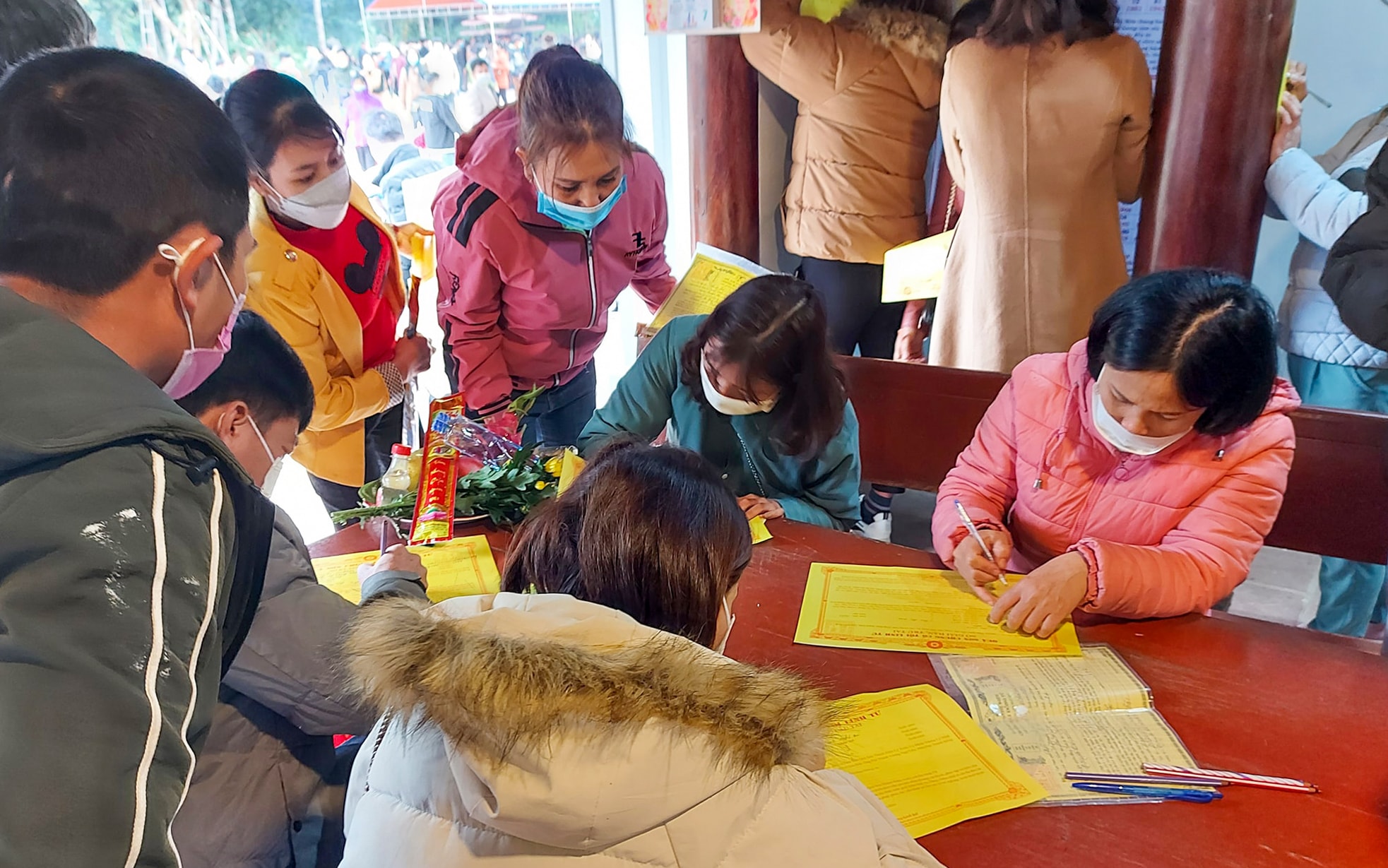
Let me give the following example to show that the shaman and the monk who perform the ritual to dispel bad luck do not have basic knowledge but still perform the ritual for everyone. Once, I went to a temple in the North on the occasion of the ritual to dispel bad luck of the star Rahu. A famous "great monk" stood up to preach: "Do you know what "Rahu" is? "La" means to shout loudly, "hou" is the throat. When we encounter bad luck like a car accident, what do we do? Use our throat to shout loudly. That's it..." Then the "great monk" chanted the eight evils about accidents, about the need to dispel bad luck...
In fact, Rahu is not a star, it is a special astronomical phenomenon but has a rule: Lunar eclipse and solar eclipse. Ancient Indian beliefs considered it a star (Rahula, transliterated into Chinese as “La Hầu La”, in short as La Hầu, the meaning of this word is to cover the moon and to cover the sun) and then mythologized it into a god (Atula). Buddhism has absorbed this god into its scriptures.
Ketu (in Sanskrit and Pali is “ketu”) is a comet phenomenon, not a fixed star like other stars. Ancient Indian culture has mythologized this phenomenon. Buddhists have created images of banners, pennants, flags, flags, etc. A square, hexagonal, or octagonal piece of cloth or paper originally printed with a star, attached to it are tassels of one color or many colors (depending on the ritual, the star is replaced by another image or letter, tassel) symbolizing the tail of the comet. They use it to perform rituals to ward off evil spirits and demons.
Thus, the two main sources of Chinese Taoist practice and partly the rituals (rules and regulations) of Indian Buddhism when spreading to the East were negatively assimilated by us. Ancient astronomical knowledge was exploited for worship. The person performing the ceremony did not understand and the person attending the ceremony did not understand, that is superstition.
People still go to temples and pagodas to pray for good luck for many reasons. Of the 9 stars, 6 are bad stars, so 2/3 of the superstitious people come to worship. But the most basic issue is the psychological issue of "worshiping is sacred, abstaining is good". But many people in other countries do not worship stars and do not encounter bad luck, they are still civilized and developed. Beliefs depend on whether you believe them or not, but being blindly attached to superstitions is absolutely not a good thing.
PV:As a native of Nghe An, you must have many times learned about and experienced the atmosphere of Spring travel at temples, pagodas as well as the Spring festivals in Nghe An. Could you share some of your feelings about the festivals as well as the religious activities at these festivals?
Researcher Nguyen Hung Vi:Nghe An is known as a land with many heritages, a dense system of temples, pagodas and shrines. Basically, every village and commune has relics and depending on the scale, almost every village has festivals associated with the relics.
After the difficult war, after peace was restored, many relics were lost, and many festivals were also interrupted in organization. And the festival revival in Nghe An was also later than in the Northern Delta.
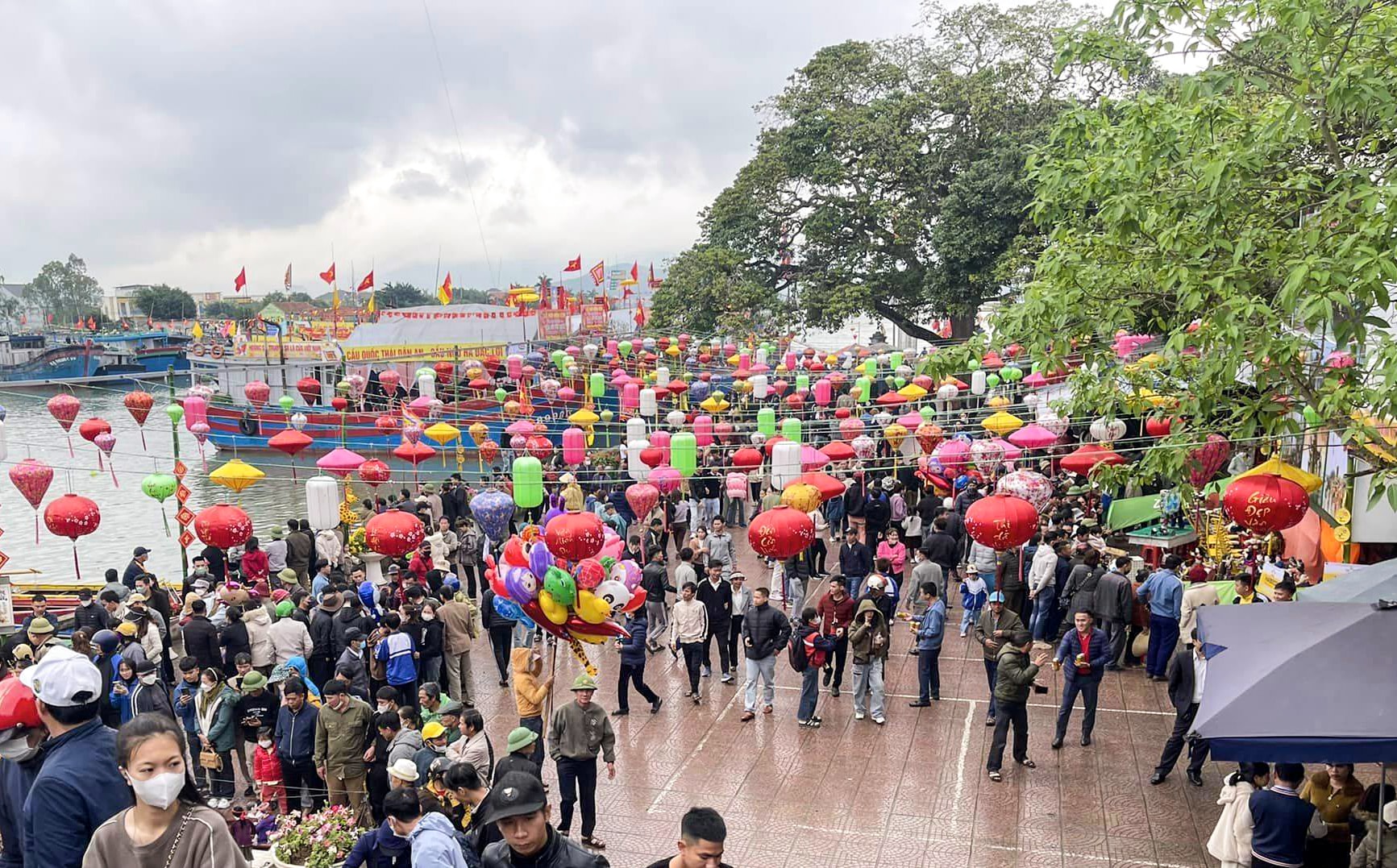
Recently, festivals such as Con Temple, Cuong Temple, Bua Cave, Ong Hoang Muoi Temple, Chin Gian Temple, Qua Son Temple, Bach Ma Temple... have been restored, responding to the culture and beliefs of the people. The festivals have revived, but due to the different characteristics of residents, economy and beliefs in this land compared to the North, the richness of festival activities has not been promoted, at the same time, superstitious elements have not yet broken out strongly.
PV:In your personal opinion, to ensure a civilized lifestyle in religious activities during the festival season, what solutions are needed from the government, relevant agencies and the people?
Researcher Nguyen Hung Vi:Traditional festivals have a whole system of valuable values that need to be preserved, promoted and developed such as: Inspiration about the origin, remembering the person who planted the tree when eating the fruit, community consensus spirit, comprehensive performance movements (processions, rituals, performances, folk songs, theater, decoration, exhibitions, cuisine, communication, etiquette), the spirit of personal affirmation and the need for happiness to be affirmed and respected, expanding social relations through communication and welcoming guests, rest and entertainment after a time of hard work, arousing desires and expectations for the future, the enjoyment of art performances by the whole population...
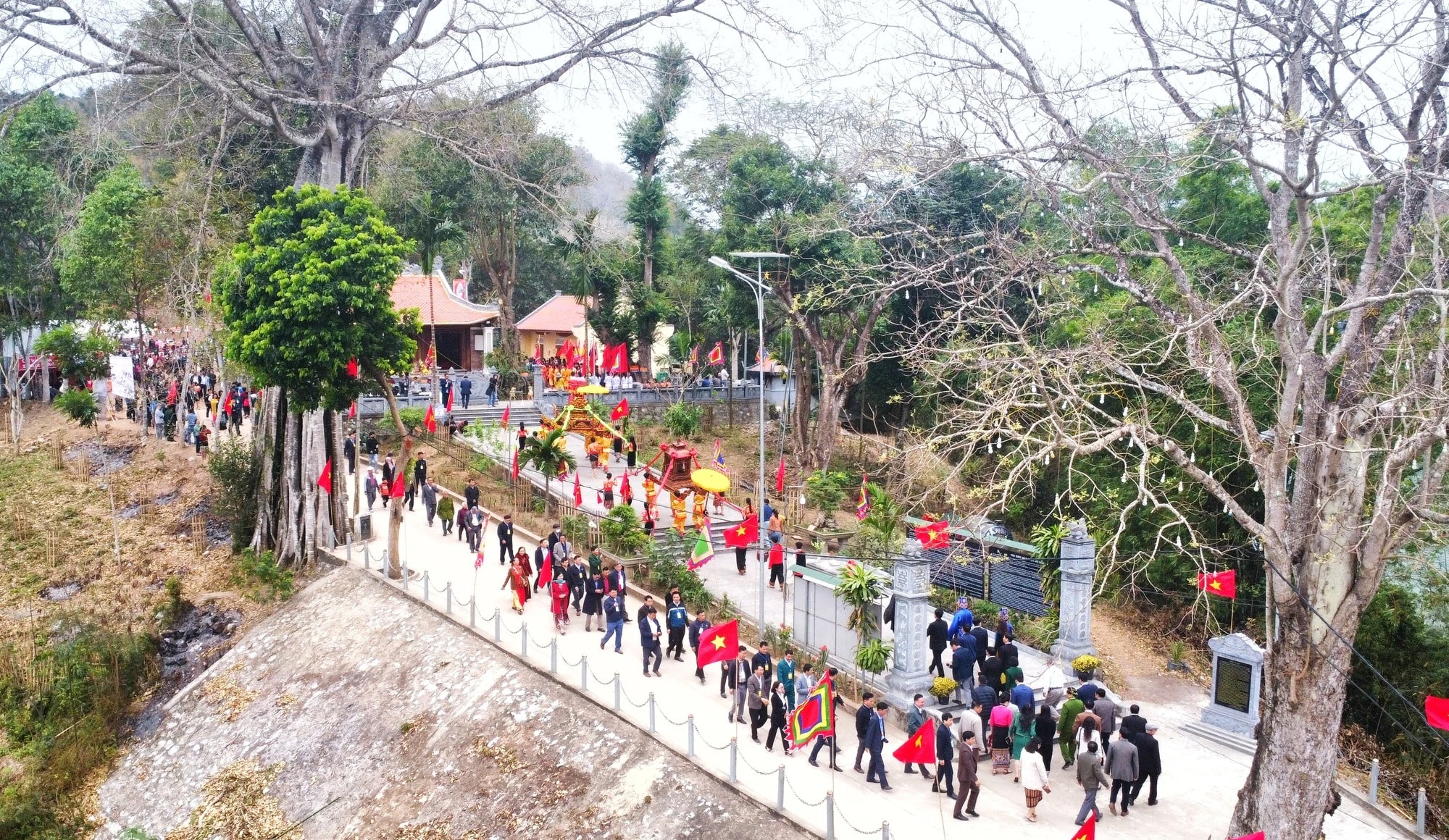
However, besides those who consider the festival as a time to return to the roots, to the values of truth - goodness - beauty, many people consider this an opportunity to bargain and make agreements with the gods to seek benefits for themselves. Therefore, it is necessary to strengthen the effectiveness of state management, further promote the awareness and responsibility of festival organizing committees and relic management boards to promptly handle and adjust deviations and distortions in the festival in accordance with the direction of the Prime Minister's Official Dispatch No. 11/CD-TTg.
On January 30, 2024, the Prime Minister issued Official Dispatch No. 11/CD-TTg on ensuring a civilized, safe, and economical lifestyle in religious and belief activities during the Lunar New Year and the Spring Festival 2024, in which it is required to prevent superstitious, distorted, and socially deviant activities, taking advantage of spiritual activities for personal gain, and not burning votive papers and votive paper indiscriminately, causing waste or being in the wrong place at religious and belief establishments.
As for the people, they need to believe and practice according to the teachings and laws, avoiding the crowd mentality that leads to superstition. When participating in religious festivals, they need to comply with the provisions of the law, ensure security, safety, and economy, and be consistent with the civilized lifestyle, cultural traditions, and good customs and practices of the nation.
On the other hand, spiritual heritage has almost no so-called “original” but is constantly moving and evolving. Therefore, research to understand festivals and their movement process is a prerequisite, from which we can identify the value of each festival to preserve that value, and at the same time distinguish what is no longer suitable for the modern humanistic spirit. From there, we can promote and develop festivals in many different ways to make them attractive and civilized.
PV:Thank you for this conversation!

